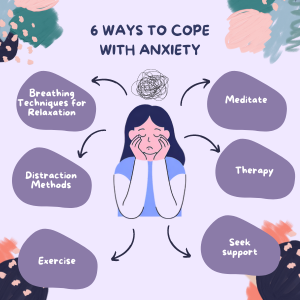Anxiety is a common mental health issue that affects many people worldwide. Anxiety, by definition, is intense, excessive, and persistent worry and fear about everyday situations. If you have trouble concentrating, sleeping, or being in big social settings, due to feeling irritable, uncomfortable, sick, sweaty, shaky, etc. Then, most likely, you have anxiety. Dealing with anxiety can be frustrating. If you are someone who experiences anxiety, then it's essential to know that there are ways to cope with it and manage its symptoms. Being in high school, I have found it challenging to think positively rather than negatively. As a result, I found many ways to cope with anxiety and live life simultaneously.
Six ways to cope with anxiety:
- Breathing Techniques for Relaxation
- Exhaling causes your heart rate to slow down, providing an immediate calming effect.
- The 4-7-8 method: This method includes breathing in for 4 seconds, holding the breath for 7 seconds, and finally exhaling for 8 seconds.
- Diaphragmatic breathing: This method includes the process of laying on your back, placing your hand diaphragm/stomach, slowly inhaling and exhaling, while also using your hand to focus on your stomach going up and down.
- Exhaling causes your heart rate to slow down, providing an immediate calming effect.
- Distraction Methods
- Focusing on something else when stressed or panicked can be useful.
- The 3-3-3 rule: Identify three objects and three sounds, then move three body parts
- The 5-4-3-2-1 Method: Identifying 5 things you can see, 4 things you can touch, 3 things you can hear, 2 things you can smell, and 1 thing you can taste.
- Focusing on something else when stressed or panicked can be useful.
- Exercise
- Doing exercises helps release chemicals in your brain that boost serotonin levels and reduce stress.
- Go for a run
- Ride a bike
- Do yoga
- Doing exercises helps release chemicals in your brain that boost serotonin levels and reduce stress.
- Meditate
- Everyone meditates differently; there isn’t a specific way to meditate.
- Read a book
- Sit in silence
- Listen to music
- Exercise
- Everyone meditates differently; there isn’t a specific way to meditate.
- Therapy
- Talking to other people who are familiar with anxiety can help with getting ideas to cope.
- It also shows that you are not alone.
- One-on-one sessions: Meeting with a therapist or counselor and discussing life in general.
- Group therapy: Meeting with a group of 5-15 people, sharing with that group, and practicing gratitude activities to improve behavioral and social skills.
- Seek support
- Always seek support from others; having a support system is very important.
- Family
- Close friends
- Therapists/Counselors
- Always seek support from others; having a support system is very important.
The key to living with anxiety is to really know what anxiety is, how it affects you, and what your triggers are. If you are able to recognize what triggers your anxiety i,t can be easier to figure out how you can cope. There are many ways to cope with anxiety; it's just a matter of finding what methods help you. Finding a method that works for you may take time, but remember to have patience. Coping with anxiety isn’t an easy task, but if you can recognize you have anxiety and how it affects you, you can learn to manage your symptoms and live a happier life.

